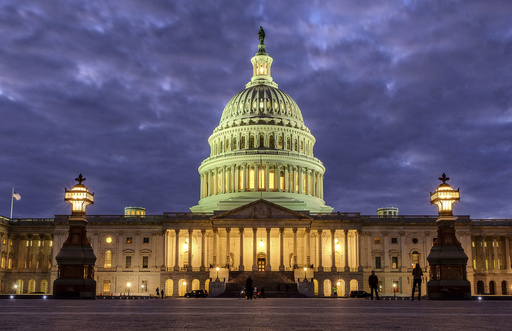
WASHINGTON — The future of Congress hangs in the balance as Tuesday’s elections are poised to influence which party secures control over the House and Senate, potentially impacting a president’s agenda or leading to a divided Congress.
These pivotal contests come amid the first presidential election cycle post-January 6, 2021, Capitol attack, and they are unfolding in various unexpected regions following what has been described as one of the most tumultuous congressional sessions in recent history.
Ultimately, the outcome may hinge on just a few seats—perhaps even a single one—could sway power dynamics in either legislative chamber.
Key topics shaping the discussions include economic policies, border security, reproductive rights, and the integrity of American democracy itself.
In the Senate, where Democrats currently maintain a narrow 51-49 lead, Republicans are expected to gain an advantage in West Virginia, following Independent Senator Joe Manchin’s retirement. Republican Jim Justice, the state’s current governor, is anticipated to win, possibly resulting in a tie in the Senate at 50-50 as Republicans vie for control.
Major House races are concentrated in New York and California, with Democrats striving to reclaim around ten seats that slipped into Republican hands in recent years. Notable lawmakers assisted in this shift, contributing to the party’s recent successes.
Additional House contests are emerging throughout the nation, indicating the increasingly tight competition, with only a couple of dozen seats being heavily contested, including fiercely debated areas in Maine, the Omaha, Nebraska area, and in Alaska.
There may be extended vote counting in several races beyond Tuesday.
“We are in a great position to take back the House,” mentioned House Democratic Leader Hakeem Jeffries, who hopes to become the first Black Speaker if his party regains control, during a recent campaign tour in Southern California.
However, House Speaker Mike Johnson, aligning closely with Trump, predicts that Republicans will retain and further solidify their majority, taking over following Kevin McCarthy’s removal.
The configuration of Capitol Hill can decisively influence a new presidential administration’s initiatives, potentially pairing Trump or Harris with allies or adversaries in Congress, or creating a divided legislative body that may lead to negotiations or stalemates.
Congress also plays a crucial role in preserving the tradition of peaceful presidential transitions. Four years ago, Trump incited his supporters to “fight like hell,” and numerous Republican lawmakers sought to cancel Joe Biden’s election certification. Once again, Congress will be tasked with validating the presidential election results in 2025.
Originally, the congressional races seemed unexciting, but the dynamics shifted dramatically when Harris stepped in for Biden at the head of the ticket, invigorating Democrats with substantial fundraising and volunteer efforts reminiscent of the enthusiasm seen during Obama’s 2008 campaign.
Both parties, along with outside groups, have invested billions into contending for control of the 435-seat House and the 100-seat Senate.
To reclaim control from Republicans, Democrats need to secure several House seats. In the Senate, the Vice President serves as the tie-breaker, meaning the outcome hinges on the presidential election.
Senate Republicans, eager to expand their opportunities, have brought in affluent newcomers to challenge Democratic incumbents across nearly ten states.
In Ohio, Trump’s endorsed Republican, Bernie Moreno, aims to dethrone three-term Democratic Senator Sherrod Brown, with approximately $400 million being poured into this contest.
One race gaining attention is in Montana, where Democrat Jon Tester, a well-liked three-term senator, is facing off against Tim Sheehy, a wealthy former Navy SEAL backed by Trump, who has made controversial remarks about Native Americans—a vital voting block in the Western state.
Moreover, in the battlegrounds of Pennsylvania, Michigan, and Wisconsin, Republicans are placing their bets on Trump as they seek to boot out incumbent Democratic senators.
Former Senate Republican leader Mitch McConnell has dedicated his career to gaining and maintaining majority status; however, some Republican opportunities are becoming increasingly uncertain.
In states like Arizona, Republican Kari Lake has faced challenges against Democrat Ruben Gallego in the race following Senator Krysten Sinema’s departure. In Nevada, Democratic Senator Jacky Rosen is working to fend off new challenger Sam Brown.
In response to the Supreme Court’s decision on abortion rights, Democrats have ramped up their competition against GOP Senators Ted Cruz of Texas and Rick Scott from Florida. Cruz is facing off against Democrat Colin Allred, while Scott has invested $10 million of his personal wealth into his campaign against Debbie Mucarsel-Powell, a former House member.
Congress stands at the threshold of achieving remarkable milestones, becoming increasingly representative of a diverse populace.
There’s a possibility that two Black women could concurrently serve as senators for the first time in U.S. history, with Democrat Lisa Blunt Rochester of Delaware favored to win against Republican Eric Hansen.
In Maryland, Angela Alsobrooks, an ally of Harris, is engaged in a closely contested battle against the state’s popular former governor, Republican Larry Hogan.
Historically, only two Black women, including Harris, have been elected as senators, but never have they served simultaneously.
In the House, Sarah McBride, a Delaware state lawmaker and close associate of the Biden family, is poised to become the first openly transgender member of Congress.
The dynamics in the House are also shifting due to redistricting, which has altered congressional district maps, potentially allowing Republicans to gain additional seats in North Carolina, while Democrats could secure a second Black-majority seat in largely Republican Alabama.
House members face re-election every two years, while senators serve six-year terms, adding another layer of complexity to electoral shifts.
Should both chambers of Congress change party control, it would be an unusual occurrence in history.
Records indicate that if Democrats claim the House while Republicans gain the Senate, it would mark the first instance of opposing parties controlling the two chambers simultaneously.
